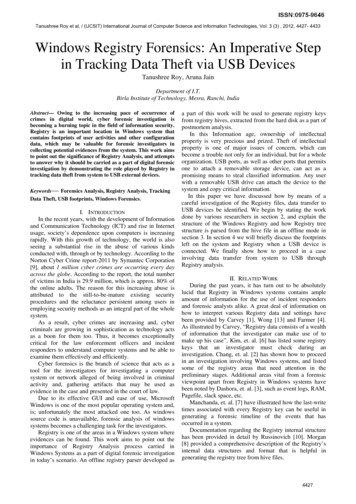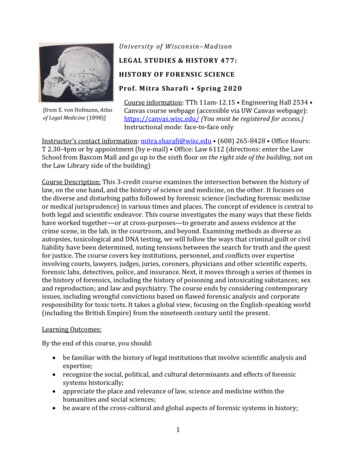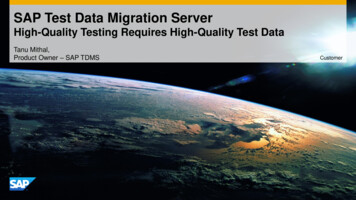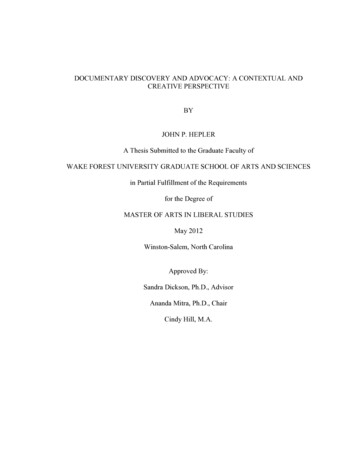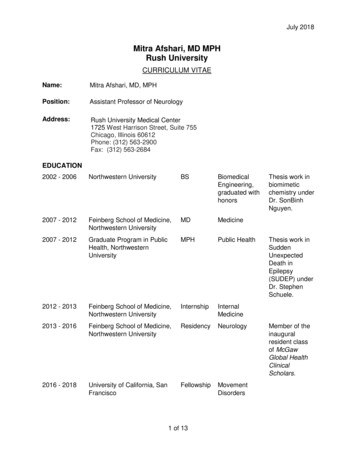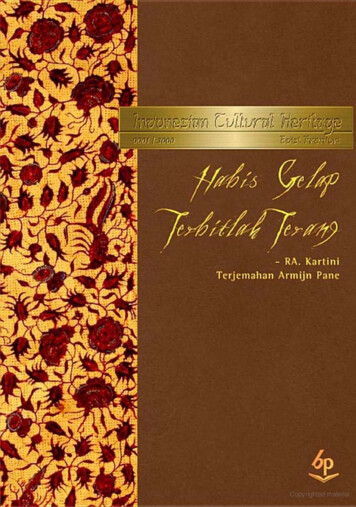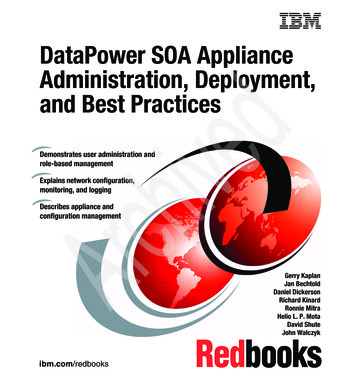
Transcription
Tanushree (Tanu) MitraAssistant ProfessorThe Information SchoolUniversity of Washington, Seattle, WAk tmitra@uw.edu m faculty.washington.edu/tmitra/RESEARCH INTERESTSMy research combines computational techniques and social science principles to study complexsocial processes underlying human behavior in large-scale online social systems. My currentresearch focus is on understanding and designing defenses against problematic information inonline social platforms and the algorithms driving them.Topics: Social Computing, Computational Social Science, Misinformation & Deception, Credibility & Trust inNews & Information, Responsibility in AI, Algorithmic Audits, Designing Human AI Hybrid Information Systemsfor Sensemaking.EDUCATIONGeorgia Institute of Technology, Atlanta, GA USAPh.D. in Computer ScienceAug 2011 – Aug 2017Thesis Topic: Understanding Social Media CredibilityCommittee: Eric Gilbert, Amy Bruckman, James Pennebaker, Scott CountsTexas A&M University, College Station, TX USAM.S. Computer ScienceAug 2009 – July 2011Masters Thesis: Cooperative Minimalistic Approach to Robotic AggressionEMPLOYMENTFall 2020 onwards2017 – Summer 2020Summer 2016Summer 2015Summer 2013Summer 2010Summer 20052005 – 2009University of Washington, Seattle, WAAssistant Professor, The Information SchoolAdjunct Asst. Prof., School of Computer Science & Engineering (CSE)Affiliate Faculty, Center for Informed Public (CIP)Co-Founder, Responsible AI Systems and Experiences (RAISE)Virginia Polytechnic Institute & State University (Virginia Tech)Assistant Professor, Department of Computer ScienceMember, Discovery Analytics Center (DAC)Member, Center for Human-Computer Interaction (CHCI)Member, Center for Peace Studies and Violence Prevention (CPSVP)Research Intern, IBM Research, Cambridge, MA USAResearch Intern, Microsoft Research, Redmond, WA USAResearch Intern, IBM Research, Cambridge, MA USASoftware Engineering Intern, Schlumberger Ltd., Houston, TX USAResearch Intern, Center for Development of Advanced Computing, IndiaSoftware Engineer, Alcoa Inc., Pittsburgh, PA USA
Tanushree (Tanu) Mitra2AWARDS AND HONORS2021Adamic-Glance Distinguished Young Researcher Award at ICWSM 20212021Office of Naval Research (ONR) Young Investigator Program (YIP) award.2021Google Research Scholar Award2021ACM CHI Conference Best Paper Honorable Mention (Top 5% of submission)20212020202020202018201820162016CSCW Conference Best Paper Honorable Mention (Top 5% of submission)Outstanding New Assistant Professor Award, Virginia Tech College of EngineeringCSCW Conference Best Paper Honorable Mention (Top 5% of submission)Fact-Checking Innovation Initiative Award from Poynter InstituteNSF-CRII Early Career AwardICTAS Junior Faculty AwardIBM Ph.D. Fellowship RecipientSelected to attend the Consortium for the Science of Socio-Technical Systems (CSST),NSF funded workshop for promising junior investigatorsFoley Scholar Recipient, GVU center’s highest award for student excellence in researchcontributions to computingCHI Conference Best Paper Honorable Mention (Top 5% of submission)ICWSM Student Travel Grant ( 350)ACL Travel Award for LTCSS workshop ( 600)Georgia Tech Research & Innovation Conference (GTRIC) Fellowship winnerGeorgia Tech Research & Innovation Conference (GTRIC) Fellowship winnerWinner SAIC: Awarded by Science Applications International CorporationRoyce E. Wisenbaker ’39 Graduate Fellowship, Texas A&M University1st position for academic performance in undergraduate UNDINGExternal Grants20222021202120212020(Co PI) The Public Interest Technology University Network (PIT-UN): The Puget SoundClinic for Public Interest Technology at the University of Washington-Seattle, 2021 - 2024,Total: 178,808. with PI: Nic Weber, Co-PI: Bill Howe.(Sole PI) Office of Naval Research (ONR) Young Investigator Program (YIP): InfluencingCommunities and Narratives: New Techniques for Understanding Adversarial InfluenceOnline, 2021 - 2024, Total: 508,476. Personal Share: 508,476.(Sole PI) Google Research Scholar: Supporting Scalable Value-Sensitive Fact-Checkingthrough Human-AI Intelligence, 2021 - 2022, Total: 60,000. Personal Share: 60,000.(Senior Personnel) National Science Foundation (NSF #2137519): NSF Convergence Accelerator Track F: Co-Designing for Trust: Reimagining Online Information Literacieswith Underserved Communities, 2021 - 2022, Total: 750,000. Personal Share: 10,999.(PI) Fact-Checking Innovation Initiative from Poynter Institute: Auditing Social Mediafor Misinformation, 2020 - 2021, Total: 99,707. Personal Share: 54,707. with Co-PI:PesaCheck, a Code for Africa (CfA) fact-checking initiative).
Tanushree (Tanu) Mitra202020192019201920183(PI) DoD’s Minerva Research Initiative: Understanding Chinese influence operationsthrough the lens of social movement theory, 2020 - 2022, Total: 399,200. Personal Share: 245,366. with Co-PI: Gwyneth Sutherlin (National Defense University).(PI) CKF Foundation: Promoting Tolerance and Civility in Online Discourse ThroughRe-designing Button Labels, 2020 - 2021, Total: 156,042. Personal Share: 135,923. withCo-PI: Tedesco (Virginia Tech).(PI) National Science Foundation (NSF #1915755) EAGER: SaTC: Early-Stage Interdisciplinary Collaboration: Designing Trustworthy and Transparent Information Platforms(2019 - 2021), REU Supplements: 16,000 (2019). with Co-PI: Horning (Virginia Tech), Total: 299,966. Personal share: 200,804.(Sole PI) Facebook & SSRC’s Social Media and Democracy Research Grants: Characterizing Mainstream and Nonmainstream Online News Sources in Social Media, 2019 - 2020,Total: 49,572. Personal share: 49,572.(Sole PI) National Science Foundation (NSF #1755547) Early Career CRII: CHS: Empiricaland Design Investigations to Combat Misleading Online News in Social Media, awarded 174,831, 2019 - 2020, REU Supplements: 16,000 (2019).Internal e PI) CIP Innovation Fund. Contestability as a Means to Interrogate Algorithms in LargeScale Socio-Technical Systems. Total: 10,000.(Sole PI) UW iSchool Innovation Fund. Supporting machine-assisted crowd expert credibilityassessment of search results. Total: 19,675.(PI) UW iSchool Strategic Research Fund (SRF). Designing Systems to Signal Credibility.with Co-PI: Amy Zhang, UW-CSE. Total: 15,000.(Co-PI) Virginia Tech Institute for Society, Culture and Environment Award. Source-FrameCongruence in US National Security Public Information Campaigns. Total: 30,000. PersonalShare: 8,000.(Sole PI) Virginia Tech Center for Peace Studies and Violence Prevention Peace Building and Violence Prevention Program Award. Investigating Hate-group Communications inOnline Social Spaces. Total: 24,915. Personal Share: 24,915.(PI) Virginia Tech ICTAS Junior Faculty Award. The Language of Online Extremism: Computational Models for Discovery and Analysis of Framing around Extremists’ Narratives. Total: 80,000. (12/72 16.7% acceptance rate).(PI) Virginia Tech ICTAS Data & Decisions grant. Empirical and Design Investigation toAddress Misleading Online News in Social Media. Total: 10,000.(PI) Virginia Tech CHCI ICAT SEAD Mini-grant. The Language of Online Extremism: Computational Models for Discovery and Analysis of Framing around Extremists’ Narratives. Total: 3,000.(PI) Virginia Tech CHCI ICAT SEAD Mini-grant. FeedReflect: Designing socio-technicalinterventions to nudge users towards reflective news reading. Total: 3,000.(Co-PI) Virginia Tech ICTAS Data & Decisions grant. Immersive Space to Think (IST):Combining Virtual Reality and Analytics for Improved Sensemaking. Total: 10,000.
Tanushree (Tanu) Mitra4PUBLICATIONSNote: indicates a student or postdoc advised by Tanushree Mitra.Refer to footnote 1 2 for publication conventions in computing disciplines.Referred Conference and Journal Papers (peer reviewed)2022 papers[40]Shruti Phadke , Mattia Samory, and Tanushree Mitra. ”Pathways through Conspiracy:The Evolution of Conspiracy Radicalization through Engagement in Online ConspiracyDiscussions” In Proc. ICWSM 2022: 16th International AAAI Conf. on Web and Social Media.Best Paper Award (Topmost paper among all ICWSM papers in 2022).[39]Prerna Juneja and Tanushree Mitra. ”Human and technological infrastructures of factchecking.” In Proc. ACM Human Computer Interaction (CSCW 2022).[38]Brian Keith Norambuena , Tanushree Mitra, and Chris North. ”Design guidelines fornarrative maps in sensemaking tasks” In Journal of Information Visualization, 2022.[37]Md Momen Bhuiyan , Carlos Isaza, Tanushree Mitra, and Sang Won Lee. ”OtherTube:Facilitating Content Discovery and Reflection By Exchanging YouTube Recommendations With Strangers” In CHI 2022: ACM Conf. on Human Factors in Computing Systems.Best Paper Honorable Mention Award (Top 5% of ACM CHI papers).2021 papers[36]Brian Keith Norambuena , Tanushree Mitra, and Chris North. ”Design guidelines fornarrative maps in sensemaking tasks” In Journal of Information Visualization, 2021.[35]Brian Keith Norambuena , Tanushree Mitra, and Chris North. ”Narrative Sensemaking:Strategies for Narrative Maps Construction” In IEEE Visualization Conference (VIS), 2021.[29% acceptance].[34]Shruti Phadke , Mattia Samory, and Tanushree Mitra.”Characterizing Social Imaginaries and Self-Disclosures of Dissonance in Online Conspiracy Discussion Communities.” In Proc. ACM Human Computer Interaction (CSCW 2021).Best Paper Honorable Mention (Top 5% of ACM CSCW papers). Accepted in reviewround 1, bypassing revise and resubmit (top 9%).[33]Md Momen Bhuiyan , Michael Horning, Sang Lee, and Tanushree Mitra. ”Designing Transparency Cues in Online News Platforms to Promote Trust: Journalists’ & Consumers’ Perspectives.” In Proc. ACM Human Computer Interaction (CSCW 2021). [32%acceptance].[32]Md Momen Bhuiyan , Michael Horning, Sang Lee, and Tanushree Mitra. ”NudgeCred:Supporting News Credibility Assessment on Social Media Through Nudges.” In Proc.ACM Human Computer Interaction (CSCW 2021). [32% acceptance][31]Shruti Phadke and Tanushree Mitra. ”Educators, Solicitors, Flamers, Motivators, Sympathizers: Characterizing Roles in Online Extremist Movements.” In Proc. ACM HumanComputer Interaction (CSCW 2021). [32% acceptance].1 Leading conferences in computer science (e.g., CHI, CSCW, ICWSM) are highly selective, undergo rigorous peerreview involving 3-4 expert referees, and intended for archival papers only. These conferences often exceed journalsin their selectivity, visibility, and impact. Please see http://portal.acm.org/citation.cfm?id 1743546.1743569 for details. Wherever available, the acceptance rate is provided following each citation. In the past few years, several CSconferences have also moved to a hybrid model with a journal component (e.g., CSCW); however, many of them aretoo new to have accrued bibliometric indicators such as impact factors.2 Student authors are typically listed first and senior authors are listed last in reverse order of contribution, withadvisor or PI as last author.
Tanushree (Tanu) Mitra5Prerna Juneja and Tanushree Mitra.”Auditing E-Commerce Platformsfor Algorithmically Curated Vaccine Misinformation.” In Proc. CHI 2021:ACM Conference on Human Factors in Computing Systems. [26.3% acceptance].Best Paper Honorable Mention (Top 5% of ACM CHI papers).2020 papers[29]Eslam Hussein , Prerna Juneja and Tanushree Mitra. ”Measuring Misinformation inVideo Search Platforms: An Audit Study on YouTube.” In Proc. ACM Human ComputerInteraction 4 (CSCW 2020). [21.9% acceptance].[28]Shruti Phadke , Mattia Samory and Tanushree Mitra. “What Makes People Join Conspiracy Communities?: Role of Social Factors in Conspiracy Engagement.” In Proc. ACMon Human-Computer Interaction 4 (CSCW 2020). Best Paper Honorable Mention (Top 5%of ACM CSCW papers). Accepted in review round 1, bypassing revise and resubmit (top7.9%).[27]Brian Keith Norambuena and Tanushree Mitra. ”Narrative Maps: An AlgorithmicApproach to Represent and Extract Information Narratives” In Proc. ACM on HumanComputer Interaction 4 (CSCW 2020). Accepted in review round 1, bypassing revise andresubmit (top 9%).[26]James Hawdon, Shyam Ranganathan, Shane Bookhultz and Tanushree Mitra. ”SocialMedia Use, Political Polarization, and Social Capital: Is Social Media Tearing the USApart?” In International Conference on Human-Computer Interaction, 2020.[25]Mattia Samory , Vartan Kesiz Abnousi and Tanushree Mitra. ”Characterizing the SocialMedia News Sphere through User Co-Sharing Practices.” In Proc. ICWSM 2020: 14thInternational AAAI Conference on Web and Social Media. [16.9% acceptance].[24]Shruti Phadke and Tanushree Mitra. ”Many Faced Hate: A Cross Platform Study ofContent Framing and Information Sharing by Online Hate Groups.” In Proc. CHI 2020:ACM Conference on Human Factors in Computing Systems. [24.3% acceptance].[23]Prerna Juneja , Deepika Ramasubramanian and Tanushree Mitra. ”Through the Looking Glass: Study of Transparency in Reddit’s Moderation Practices.” In Proc. GROUP2020: ACM Conference on Supporting Group Work. [31% acceptance].[22]Md Momen Bhuiyan , Amy X Zhang, Connie Moon Sehat, and Tanushree Mitra. ”Investigating Differences in Crowdsourced News Credibility Assessment: Raters, Tasks,and Expert Criteria” In PACMHCI. 4, Computer-Supported Cooperative Work (CSCW 2020).[35.8% acceptance].[21]Zhen Guo, Jin-Hee Cho, Ing-Ray Chen, Srijan Sengupta, Michin Hong, and TanushreeMitra. ”Online Social Deception and Its Countermeasures: A Survey.” In IEEE Access,Volume 9 (2020).2019 and before[20]Mattia Samory and Tanushree Mitra. ”SENPAI: Supporting Exploratory Text Analysisthrough Semantic & Syntactic Pattern Inspection.” In Proc. ICWSM 2019: 13th International AAAI Conference on Web and Social Media. [17% acceptance].[19]Mattia Samory and Tanushree Mitra. “The Government Spies Using Our Webcams:The Language of Conspiracy Theories in Online Discussions.” In Proc. CSCW 2018: Proceedings on Computer-Supported Cooperative Work and Social Computing. [26.1% acceptance].[18]Mattia Samory and Tanushree Mitra. “Conspiracies Online: User discussions in a Conspiracy Community Following Dramatic Events.” In Proc. ICWSM 2018: 12th InternationalAAAI Conference on Web and Social Media. [16% acceptance].[30]
Tanushree (Tanu) anushree Mitra, Graham Wright and Eric Gilbert. “Credibility and the Dynamics ofCollective Attention” In Proc. CSCW 2018: Proceedings of the ACM on Human-ComputerInteraction. [26.1% acceptance].Tanushree Mitra, Michael Muller, Sadat Shami, Abbas Golestani and Mikhil Masli.“Spread of Employee Engagement in a Large Organizational Network: A Longitudinal Analysis” In Proc. CSCW 2018: Proceedings of the ACM on Human-Computer Interaction.[26.1% acceptance].Michael Muller, Tanushree Mitra, and Werner Geyer. Growth in Social Network Connectedness among Different Roles in Organizational Crowdfunding – In Proc. GROUP2018: ACM Conference on Supporting Group Work Group 2018. [28% acceptance].Tanushree Mitra, Graham Wright and Eric Gilbert. “A Parsimonious Language Modelof Social Media Credibility Across Disparate Events” In Proc. CSCW 2017: 20th ACM Conference on Computer-Supported Cooperative Work and Social Computing. [34% acceptance].Tanushree Mitra, Scott Counts and James W. Pennebaker. “Understanding AntiVaccination Attitudes in Social Media.” In Proc. ICWSM 2016: 10th International AAAIConference on Weblogs and Social Media. [16% acceptance].Stevie Chancellor, Tanushree Mitra, and Munmun De Choudhury. “Recovery amid proanorexia: Analysis of recovery in social media.” In Proc. CHI 2016: 33rd Annual ACMConference on Human Factors in Computing Systems. [23% acceptance].Tanushree Mitra, and Eric Gilbert. “CREDBANK: A Large-scale Social Media CorpusWith Associated Credibility Annotations.” In Proc. ICWSM 2015: Ninth InternationalAAAI Conference on Web and Social Media [19% acceptance].Tanushree Mitra, C.J. Hutto, and Eric Gilbert. “Comparing Person-and Process-centricStrategies for Obtaining Quality Data on Amazon Mechanical Turk.” In Proceedings ofthe 33rd Annual ACM Conference on Human Factors in Computing Systems, CHI 2015. BestPaper Honorable Mention (Top 5%).Soni Sandeep, Tanushree Mitra, Eric Gilbert and, Jacob Eisenstein. “Modeling Factuality Judgments in Social Media Text.” In Proceedings of the Association for ComputationalLinguistics – ACL 2014.Tanushree Mitra, and Eric Gilbert. “The language that gets people to give: Phrases thatpredict success on Kickstarter.” In Proc. CSCW 2014: 17th ACM conference on ComputerSupported Cooperative Work and social computing. [27% acceptance].Tanushree Mitra, and Eric Gilbert. “Have You Heard?: How Gossip Flows ThroughWorkplace Email.” In Proc. ICWSM 2012: Sixth International AAAI Conference on Weblogsand Social Media [20% acceptance].Tanushree Mitra, and Dylan A. Shell. “Cost, Precision, and Task Structure in AggressionBased Arbitration for Minimalist Robot Cooperation.” In Proceedings of the InternationalConference on Simulation of Adaptive Behavior. – SAB 2012.Poster Papers (peer reviewed)[5][4]6Brian Keith Norambuena , Tanushree Mitra, and Chris North. “Exploring the Information Landscape of News using Narrative Maps.” In Computation Journalism Symposium(C J 2021).Md Momen Bhuiyan , Amy X Zhang, Connie Moon Sehat, and Tanushree Mitra. ”‘Who‘in the Crowdsourcing of News Credibility.” In Computation Journalism Symposium (C J2020).
Tanushree (Tanu) Mitra[3][2][1]7Brian Keith Norambuena , Michael Horning, and Tanushree Mitra. “Evaluating theInverted Pyramid Structure through Automatic 5W1H Extraction and Summarization.”In Computation Journalism Symposium (C J 2020). Accepted for oral presentation. [17%acceptance].Momen Bhuiyan , Kexin Zhang , Kelsey Vick, Michael Horning and Tanushree Mitra.”FeedReflect: A toolkit for engaging users in active reflection on Twitter” – ExtendedAbstract of CSCW 2018.Shruti Phadke , Jonathan Lloyd, James Hawdon and Tanushree Mitra. ”Framing Hatewith Hate Frames: Designing the Codebook.” – Extended Abstract of CSCW 2018.Workshops and Other Juried Publications[W6][W5][W4][W3][W2][W1]Tanushree Mitra. ”Contestability in Large-Scale Interactive NLP Systems.” – Invited participants at the Workshop of HCI NLP Bridging Human–Computer Interaction and NaturalLanguage Processing at the 16th Conference of the European Chapter of the Association for Computational Linguistics, EACL 2021.Shruti Phadke , Jessie Seiler , Tanushree Mitra, Kiran Garimella, Matthew Costello,James Hawdon. ”Addressing Challenges and Opportunities in Online Extremism Research: An Interdisciplinary Perspective.” – Workshop Organizer at the 24th ACM Conference on Computer-Supported Cooperative Work and Social Computing, Extended Abstract ofCSCW 2021.Emelia May Hughes , Renee Wang , Prerna Juneja , Tanushree Mitra, Amy Zhang. ”Introducing Credibility Signals and Citations to YouTube.” – Invited participants at the Information Credibility & Alternative Realities in Troubled Democracies Workshop at the 15thInternational Conference on Web and Social Media, ICWSM 2021.Prerna Juneja and Tanushree Mitra. ”Algorithmic nudge: Using XAI frameworks todesign interventions.” – Invited participants at the Operationalizing Human-centered Perspectives in Explainable AI Workshop at the 2021 ACM CHI Virtual Conference on Human Factorsin Computing Systems, CHI 2021.Prerna Juneja and Tanushree Mitra. ”Investigating the impact of personalization onmisinformation present in algorithmically curated content in YouTube.” – Invited participants at the 3rd FAccTRec Workshop: Responsible Recommendation at the 14th ACM Conferenceon Recommender Systems, RecSys 2021.Tanushree Mitra. ”Contestability in Large-Scale Online Algorithmic Systems.” – Invitedparticipants at the Contestability in Algorithmic Systems Workshop at the 22nd ACM Conferenceon Computer-Supported Cooperative Work and Social Computing, CSCW 2019.INVITED PRESENTATIONSMar 2022Nov 2021Nov 2021Nov 2021Oct 2021Seminar Series at the University of Michigan, Information School, upcomingKeynote at 9th AAAI Conference on Human Computation and Crowdsourcing(HCOMP 2021)Keynote at Google’s Long-term Dynamics for Responsible Recommendation Systems WorkshopFall’21 Seminar Series at Stanford Cyber Policy Center led by the Program onDemocracy and the InternetAlgorithmic Governance: Auditing Search and Recommendation Algorithms forMisinformation, Truth and Trust Online
Tanushree (Tanu) MitraJuly 2021May 2021May 2021May 2021Mar 2021Nov 2020Oct 2020Mar 2020Mar 2020Feb 2020Feb 2020Feb 2020Jan 2020Nov 2019July 2019July 2019Jun 2019Mar 2019Oct 2018July 2018July 2018Apr 2017Mar 2017Feb 2017Feb 2017Feb 2017Feb 2017Jan 2017Mar 201687th Summer Workshop and Internship on "Computational Techniques for SocialGood" at IGDTUW, IndiaAcademic Research on YouTube: The State of the Field and Potential Future Directions, at StanfordPanelist at Exploring Bias & Technology: A Tri-Campus Discussion, with Coded BiasFilm DirectorAlgorithmic Bias and Governance, iSchool’s Alumni and Community Spring LectureAlgorithmic Governance: Auditing Search and Recommendation Algorithms forMisinformation, Spotify ResearchAlgorithmic Governance: Auditing Search and Recommendation Algorithms forMisinformation, Research Symposium, UW iSchoolUnderstanding and Countering Problematic Information on Social Media Platforms,DUB Seminar, UWDept. of Computer Science, School of Interactive Computing at Georgia TechSchool of Information, The University of Texas at Austin, TXDept. of Computer Science, Emory UniversityPanel on Influence Campaigns & Future Technologies, National Academy of Sciences, Washington DC.Speaker at MisinfoCon, Washington DC.Dept. of Computer Science, Emory University, Atlanta, GAThe Future of Speech Online, Center for Democracy & Technology, Washington DCCombating Misinformation Convening, Google, Mountain View, CAISAT/DARPA Cognitive Defense: Detecting and Defending Against Influence Operations WorkshopIARPA CASE Panel: Innovations in Credibility of Information, Washington DCEmerging Trends in Social Media, NATO StratCom Centre Of Excellence, Riga,LatviaUrban Dynamics Institute Seminar Series, Oak Ridge National Lab (ORNL), TNISAT/DARPA Coginitive Defense: Designing for Defense WorkshopCombating Misinformation Convening, Google, Mountain View, CADept. of Computer Science & Engineering, University of Minnesota, Minneapolis,MNSchool of Information Studies, Syracuse University, NYDept. of Computer Science, Virginia Tech, Blacksburg, VASchool of Informatics and Computing, Indiana University, Indianapolis, INCollege of Information Studies, University of Maryland, College Park, MDDept. of Computer Science, University of Maryland, College Park, MDDept. of Communication Studies, Northwestern University, Evanston, ILFoley Scholars Brown Bag, GVU Center at Georgia Tech, Atlanta, GAPROFESSIONAL ACTIVITIES & RANKS HELDProgram ChairEditorial BoardExecutive Board of TrusteesOrganizing CommitteeAdvisory CommitteeICWSM 2022Nature Scientific Reports 2022, Journal of Online Trust andSafety 2021, 2022TTO 2021, 2022 Conference for Truth and Trust OnlineTTO 2020, Conference for Truth and Trust OnlineSocial Data Initiative, Social Science Research Council SSRC
Tanushree (Tanu) Mitra9Tutorial Co-ChairWorkshop Co-ChairSenior Program CommitteeBest Paper Chairs CommitteeProgram CommitteeReviewerICWSM 2020CSCW 2019ICWSM 2021, 2019, 2018 & 2016CSCW 2021, 2020CSCW 2020, 2018, CHI-LBW 2018, WWW 2018, 2015, ICWSM2014, 2015Science Advances 2020, CHI 2014-2017, CSCW 2013-2016,WSDM 2014, WWW 2016TEACHING EXPERIENCENote: A: Developed new courses.Instructor, University of Washington, Seattle, WAAutumn 2021 IMT 573 : Data Science - Theoretical Foundations (Graduate, 40 students)Combined Median Course Evaluation: 4.1/5.0, Response Rate: 94% very high IMT 547 A: Social Media Data Mining & Analysis (Graduate, 40 students)Winter 2021Combined Median Course Evaluation: 4.6/5.0, Instructor’s Contribution Median: 4.8/5.0, ResponseRate: 54% very high IMT 573 : Data Science - Theoretical Foundations (Graduate, 40 students)Autumn 2020Combined Median Course Evaluation: 4.6/5.0, Instructor’s Contribution Median: 4.7/5.0, ResponseRate: 77% very highInstructor, Virginia Tech, Blacksburg, VA CS 3654: Intro Data Analytics & Visual (Undergrad, 90 students, 3 sections)Spring 2020– Section CS: Median Teaching Effectiveness Score: 6.0/6.0, Response Rate: 46.43%– Section CMDA: Median Teaching Effectiveness Score: 5.0/6.0, Response Rate: 44.90%– Section STAT: Median Teaching Effectiveness Score: 5.0/6.0, Response Rate: 66.67% CS 4984 A : Data Science & Analytics Capstone (Undergraduate, 25 students) Spring 2019Median Teaching Effectiveness Score: 5.40/6.0, Response Rate: 90.90% CS 5984 A: Social Computing (Graduate course, 25 students)Fall 2018Median Teaching Effectiveness Score: 5.09/6.0, Response Rate: 78.60% CS 6724 A : Computational Social Science (Graduate Seminar, 18 students)Spring 2018Median Teaching Effectiveness Score: 5.82/6.0, Response Rate: 91.67% CS 4984 A : Social Computing Capstone (Undergraduate, 18 students)Fall 2017Median Teaching Effectiveness Score: 5.13/6.0, Response Rate: 83.33%MENTORING & ADVISINGPostDoctoral Scholar Supervised, Virginia Tech Mattia Samory – Ph.D., University of Padova,Fall 2017 - Fall 2018First Position as research scientist in GESIS - Leibniz Institute for the Social Sciences, Germany.Current Ph.D. Students, University of Washington Kristen Engel – Ph.D. Informatics Shruti Phadke – Ph.D. Informatics Prerna Juneja – Ph.D. InformaticsCurrent Ph.D. Students, Virginia TechFall 2021 – presentFall 2018 – presentFall 2018 – present
Tanushree (Tanu) Mitra MD Momen Bhuiyan – Ph.D. CS Brian Felipe Keith – Ph.D. CS10Fall 2017 – presentFall 2019 – presentMasters Students Supervised, University of Washington Lee Polla – MSIM Early Career Accelerated Shuang Zhao – MSIM Prathamesh S. Mahankal – MSIM Independent StudySpring 2022Spring 2022Winter 2020Masters Students Supervised, Virginia Tech Deepika Ramasubramanian – M.S. CS woman of color in CSFirst Position: PhD student at CU Boulder Information Science. Vartan Kesis Abnousi – M.S. CS Ashish Baghudana – M.S. CS Shruti Phadke – M.S. ECEFirst Position as a Ph.D. student at Virginia Tech, now at UW.Fall 2019 – Summer 2020Fall 2018 – Fall 2020Fall 2017Fall 2017Graduate Thesis Committees, University of Washington Emily Porter – Ph.D. Information ScienceSydney Metts – Ph.D. Information ScienceKayla Duskin – Ph.D. Information ScienceStephen D. Prochaska – Ph.D. Information ScienceJim Chen – Ph.D. Information Science (GSR)Judith Yaaqoubi – Ph.D. HCDE, UWFall 2021–presentSpring 2022–presentSpring 2022–presentSpring 2022–presentFall 2021–presentFall 2020Graduate Thesis Committees, Virginia TechFall 2020 – Summer 2021 Lindah Kotut – Ph.D. Computer ScienceFirst Position: Tenure Track Faculty at University of Washington, ISchool. Sukrit Venkatagiri – Ph.D. Computer ScienceSpring 2022 Whitney Hayes – Ph.D. SociologySpring 2023 Ziqian Alice Song – Ph.D. Computer ScienceSummer 2020First Employment: Assistant Professor, University of Scranton Viral Pasad – M.S. Computer Science (Graduated)Summer 2020 Patrick Sullivan – M.S. Computer Science (Graduated)Fall 2019 Siddharth Krishnan – Ph.D. Computer Science (Graduated)Fall 2018 Meghendra Singh – M.S. Computer Science (Graduated)Fall 2018Undergraduate Research Assistants, UW Vincent Zhou — B.S. UW CSEthan Yee — B.S. UW CSLouis Leng — B.S. UW InformaticsBenjamin Ye — B.S. UW CSAlice Zhang — B.S. UW CSHayoung Jung — B.S. UW CSDavid Xie — B.S. UW InformaticsEmelia M Hughes — B.S. UW Informatics,Renee Wang — B.S. UW CS,Sophia Wang – B.S. C.S., Brandeis University (NSF-REU)Summer 2022Summer 2022Summer 2022Summer 2022Spring 2022Winter 2021 – presentAutumn 2021 – presentWinter 2021 – presentSpring 2021 – presentSummer 2021
Tanushree (Tanu) Mitra Naitian Zhou – B.S. C.S., University of Michigan (NSF-REU) Srinidhi Balaram — B.S. UW Informatics, Stephanie Zhang — B.S. UW Informatics11Summer 2021Autumn 2021Winter 2020Undergraduate Research Assistants, Virginia Tech Stephen Tan – B.S. C.S., VTechHenry Wang – B.S. C.S., VTech (NSF-REU)Danielle Ababa – B.S., VT Comm. (NSF-REU)Jonathan Alexander – B.S. C.S.Ankita Khera – B.S. C.S.Liz Dao – B.S. C.S.Liling Yuan – B.S. C.S.Barrett Lattimer – B.S. C.S.Margaret Stump – B.S. C.S.Andy Du Zhang – B.S. C.S.Hithesh Peddamekala – B.S. C.S.Matthew Bernas – B.S. C.S.Kexin Zhang – B.S. IsYE (GaTech)Spring 2019, Spring 2020Fall 2019, Spring 2020Fall’19, Spr’20Fall 2019, Spring 2020Fall 2019Fall 2019Fall 2019Fall 2018Spring 2018Spring 2018Spring 2018Spring 2018Fall 2016Previously Mentored Students Shruthi K. Hiremath – M.S. C.S. (GaTech): Masters ProjectFall 2016Sanjana Shankar – M.S. C.S. (GaTech): Masters ThesisSpr’16 to Fall’16Graham Wright – B.S. C.S. (GaTech): Credibility ProjectSummer 2015 to PresentAkanksha – M.S. C.S. (GaTech): Masters ThesisFall 2015Amish Goyal – M.S. C.S. (GaTech): Topic Modeling in TwitterFall 2013Mohammad Asgharneya – M.S. C.S. (GaTech): Detecting Stock Market LiarsFall 2012Karthik Uppuluri – B.S. C.S. (GaTech): Comparing Tweets & QueriesSummer 2012Sarena Chism – Louis Stokes Alliance for Minority Participation (LSAMP) Fall 09 - Spr’10SELECTED PRESS COVERAGESubject MatterExpertAmazon AuditCHI’21 [30]TechCrunch (Jun 2022). Spotify forms a safety council to rethink its contentmoderation policies.The Guardian (Dec 2021). AmazonSmile donated more than 40,000 to antivaccine groups in 2020.GeekWire (Dec 2021). COVID-19 misinformation still featured on Amazon,months after inquiries from lawmakers.Venture Beat (Jan 2021). UW researchers say Amazon’s algorithms spread vaccine misinformation.Brookings Tech (June 2021). The conspiracy and disinformation challenge one-commerce platformsKing-TV (Jan 2021). Aired on Janu
2009-2010 Royce E. Wisenbaker '39 Graduate Fellowship, Texas A&M University 2002 1st position for academic performance in undergraduate studies. FUNDING External Grants 2022 (Co PI) The Public Interest Technology University Network (PIT-UN): The Puget Sound . [21] Zhen Guo, Jin-Hee Cho, Ing-Ray Chen, Srijan Sengupta, Michin Hong, and .
